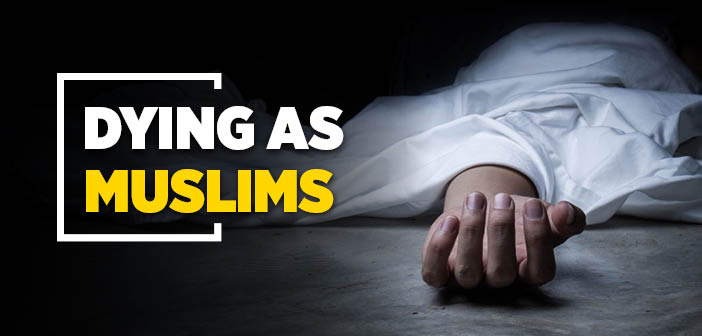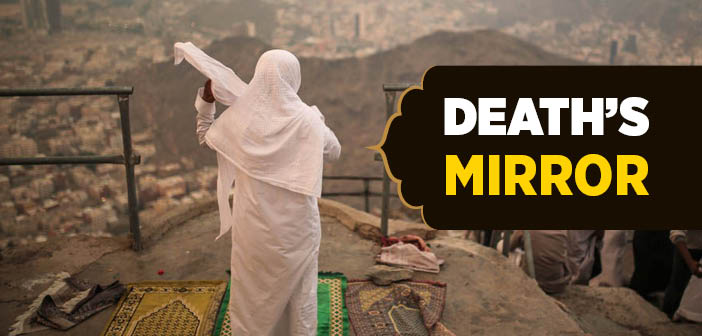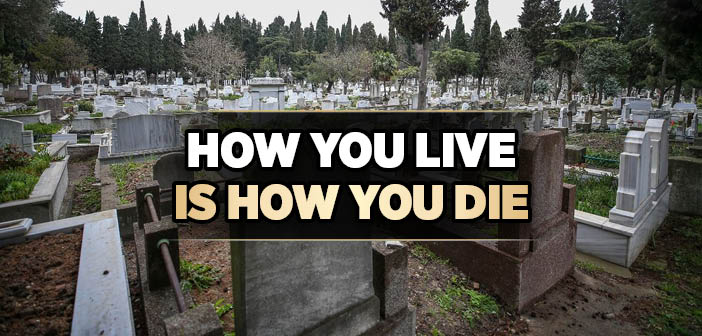What does the quran say about the resurrection? How will muslims be resurrected?
You will die as you have lived and will be resurrected as you have died.
Life is like the drops that fill a glass. One’s last breath, or their death, is like the last drop poured into the glass which causes the water to overflow. The clarity of the water depends on the clarity of the drops. It is essential that these droplets are not contaminated with the impurity of wrongdoing in order for a person to appear before Allah in complete purity.
The greatest sign of our spiritual state at our last breath is how we use our breath in the here and now. So, it is essential that each and every breath we take is preparation for the last breath, that we bid fair farewell to this fleeting abode. For, it has been stated:
“A person dies as they have lived and will be resurrected as they have died.” (Munawi, Fayd al-Qadr Sharh al-Jami’ al-Saghir, V, 663)
That is to say, the spiritual quality of all the breaths we take in all our acts of worship, daily dealings and behaviour, constitute a kind of indicator of our last breath, like a kind of worldly indication of our state in the Next World.
The following incident aptly illustrates this point:
Bahlul Dana, who lived during Abbasid rule, would look at the shaky wall of a desolated building and delve into contemplation of his end. Again, one day, as he looked on with worry, the wall suddenly collapsed. His face assumed an expression of joy. When those around him could not understand this change in emotion enquired, he said, “Do you not see, the wall collapsed in the direction to which it was tilted?”
When they asked what was so surprising about this, he offered the following wise words:
“Given that everything in the world is destined to collapse toward the side to which it is inclined, I am inclined towards Allah, so when I die, I will reach Him. O people, let us increase our bowing down and prostration that we do not collapse in other directions.”
‘Ubaydullah Ahrar relates:
“A righteous man saw Baha’ al-Din Naqshband (may Allah have mercy upon him) in his dream after his death and asked him:
‘What should we do for our eternal deliverance?’ Baha’ al-Din Naqshband replied:
‘Preoccupy yourself with whatever one needs to be preoccupied with at the last breath’. In other words, just as we are required to think only about Allah Almighty at death, then we should be conscious in this same way throughout our lives.[1]
Whatever hearts are mostly engaged with during one’s life, this is what they become busy with at death. In other words, a person dies as they have lived. There are countless examples of this.
For instance, famous hadith narrator ‘Abdulaziz ibn Abi Rawwad relates a remarkable event to which he was witness:
“I was on my way to the Prophet’s Mosque in Madina when a woman approached in haste and said:
‘If you wish to earn rewards come help! There is a gravely ill young man who is on his death bed. Urge him to recite the Shahada (declaration of faith).’
I rushed to his side but however much I tried to prompt the man to say Lā ilāha illāllah, it was in vain, for the man just would not say it. At one point, he opened his eyes and said:
‘You keep telling me to recite these words, but it has been some time now that I have turned away from this Profession and from the religion of Islam. And now I just cannot say it.’ He died shortly afterwards.
When I later enquired about him, I learned that he was an alcoholic. I remembered the Messenger of Allah (may Allah bless him and grant him peace) saying, ‘One who is addicted to wine is like a worshipper of idols.’[2]
So, a dark life cannot have a luminous end.
Ar-Rabi’ ibn Khaytham (may Allah have mercy on him) relates in an anecdote:
“I was once present by the side of a man in the throes of death. As I prompted him to say, ‘There is no god but Allah (Lā ilāha illāllah)’, he seemed not to hear me, instead continuing to calculate something with his fingers, as though he were counting money.” (In other words, he breathed his last breath upon the state in which he lived).”
Where and in which state, then, do we wish to meet death? In what circumstances will our certain meeting with the Angel of Death take place? This is precisely the concern that a believer’s heart should perpetually have. For, there is also the possibility of facing death while worshipping in the mosque, when striving to earn a lawful livelihood, when in the company of the righteous, when lending an ear or offering solace to the lonely or it could take place when one is spending one’s earnings in the way of Allah for His servants. Or, on the contrary – Allah forbid – one can also die in unseemly circumstances: when breaking the heart of another; standing on the side of falsehood instead of in defence of the truth; in a moment of anger; in pursuit of base pleasures; in the presence of Allah’s enemies or wrongdoers; while witnessing evil; or while engrossed in the unlawful.
In the same way, the human being will surely be resurrected in the state in which he dies. ‘Abdullah ibn ‘Amr (may Allah be well pleased with him) once asked:
“Messenger of Allah, tell me about jihad and fighting.”
The Messenger of Allah (may Allah bless him and grant him peace) replied:
“‘Abdullah ibn Amr, if you fight sincerely and with patience, seeking your reward only from Allah, Allah will resurrect you as one who is patient and sincere, seeking your reward only from Him; but, if you fight for show, in vanity and boasting, Allah will resurrect you as a self-conceited person who fights for show off and boast.
O’ Abdullah ibn Amr, in whatever state you fight or are killed, Allah will resurrect you in that same state.” (Abu Dawud, Jihad, 24/2519; Hakim, II, 95/2437)
Other prophetic traditions on the subject are as follows:
“Every person will be raised (in the same very state) in which they die.” (Muslim, Janna, 83)
[1] Rashahat, p. 130.
[2] Ibn Majah, Ashriba, 3.
Source: Osman Nuri Topbaş , Journey To Eternity, Erkam Publications





